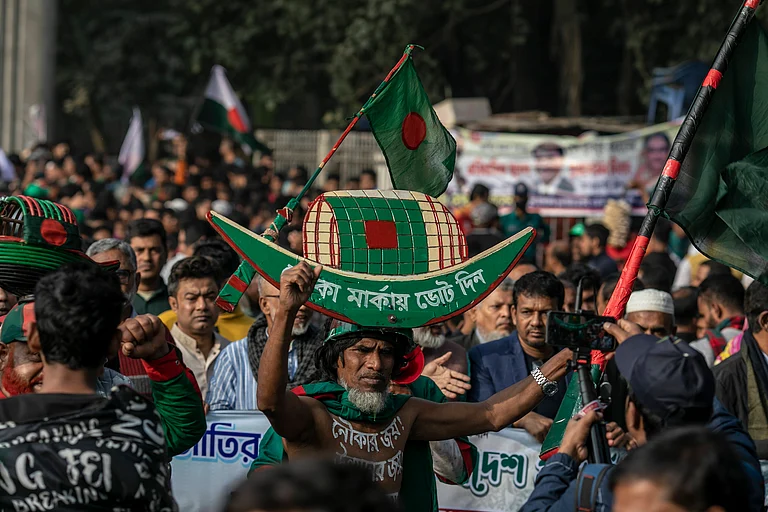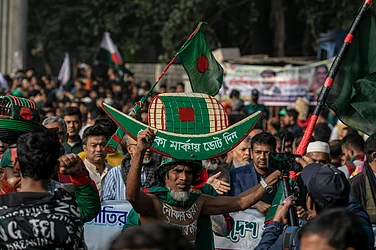Afghanistan's Taliban fighters raided hideouts of the terrorist group ISIS and killed eight ISIS terrorists, according to the Taliban regime.
The Taliban regime's spokesperson Zabijullah Mujahid on Thursday said the raids were carried out in Kabul and Western Nimroz province on Wednesday.
Mujahid said the ISIS terrorists killed had planned recent attacks, such as the Kabul hotel attack, Pakistan embassy attack, and the airbase attack.
The Afghanistan's rulers Taliban and terrorist group ISIS have fought each other for a long time. The ISIS, which is active in the country through its affiliate Islamic State in Khorasan Province (ISKP), has repeatedly carried out bombings and other attacks to undermine the Taliban regime.
Besides the eight killed, the Taliban regime also arrested nine ISIS personnel in the raids, according to Mujahid, who added that those killed also included foreign nationals.
“These members had a main role in the attack on the Chinese hotel and paved the way for foreign IS members to come to Afghanistan,” said Mujahid said in a tweet.
The recent ISIS attacks against Taliban
The ISIS group claimed responsibility for a deadly bombing near a checkpoint at the Afghan capital's military airport on Sunday. At least eight were killed and many more were injured in the attack, according to reports. The ISIS said that attack was carried out by the same militant who took part in the Longan Hotel assault in mid-December.
The ISIS regional affiliate ISKP has emerged as a key rival of the Taliban. It has increased its attacks in Afghanistan since the Taliban takeover in 2021. Targets have included Taliban patrols and members of Afghanistan's Shia minority.
The ISIS published a photo of the attacker, identifying him as Abdul Jabbar, saying he withdrew safely from the attack on the hotel after he ran out of ammunition. It added he detonated his explosives-laden vest targeting the soldiers gathered at the checkpoint.
Mujahid said light weapons, hand grenades, mines, vests and explosives were confiscated by the Taliban's security forces during the raids on an ISIS hideout in the Shahdai Salehin neighbourhood. Local residents reported sounds of several explosions and an hourslong gun battle.
What's ISKP, why is it fighting Taliban?
The terrorist group ISIS has a network of regional affiliates —kind of branches— and ISKP is the one that covers Afghanistan. In ISIS parlance, these affiliates or branches are called "wilayah" which literally means a "province".
The ISKP is named after the Khorasan Province, which is a historic region that once covered parts of Iran, Turkmenistan, and Afghanistan.
The major reason why the ISIS is fighting the Taliban is their opposing visions for Afghanistan. While the ISIS is a globalist organisations which aspires to create a global Islamic state called the Caliphate, the goals of the Taliban are national and limited to Afghanistan. It's goal is to run an Islamic state in Afghanistan called the Emirate, which it's already doing.
There are also deep ideological differences between the ISIS and Taliban.
Asfandyar Mir of Wilson Center explains further: "ISIS-K subscribes to the Jihadi-Salafism ideology — and plays up the ‘purity’ of its anti-idolatry credentials. The Taliban, on the other hand, subscribe to an alternative Sunni Islamic sectarian school, the Hanafi madhhab, which ISIS-K regards as deficient. The two groups also differ over the role of nationalism. ISIS-K fiercely rejects it, which runs counter to the Afghan Taliban’s aims of ruling over Afghanistan."
The ISKP is waging an insurgency against the Taliban regime just like the Taliban waged one against the West-backed Kabul government earlier. Though the ISIS does not enjoy the support that the Taliban had.
Moreover, the ISKP's goals are not just political but also more terrorist in nature as it not just targets Taliban but also non-Muslims and even non-Sunni Muslims, such as Shias and Hazaras. In this way, ISIS also differs from the other globalist jihadist organisation Al Qaeda.
Catrina Doxsee of Center for Strategic and International Studies (CSIS) notes, "Although both groups advocate a violent struggle against the 'far enemy' (the West), the Islamic State also emphasises fighting the 'near enemy' (apostates in the region). The Islamic State operates under a global offensive jihad to rid its territory of both foreign infidels —non-believers of Islam— and apostates and endorses violence against the local community if they object to the adherence to sharia and do not conform to Islamic State dogma. For example, ISKP has launched numerous attacks on members of Afghanistan’s Hazara Shia minority."
At least 700 Hazaras have been killed in ISKP attacks since the takeover of Afghanistan by the Taliban, noted Human Rights Watch last year.
(With AP inputs)


























